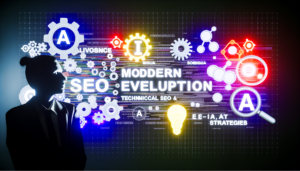The Role of Artificial Intelligence in Modern SEO Strategies
Search Engine Optimization (SEO) has evolved dramatically with the integration of Artificial Intelligence (AI), reshaping how businesses approach visibility, content creation, and user engagement. As search engines like Google increasingly rely on AI-driven algorithms—such as RankBrain and BERT—to interpret user intent and rank content, marketers must adapt their strategies to stay competitive. This article explores how AI is revolutionizing SEO, from automating keyword research to enhancing content personalization. We’ll delve into practical applications, ethical considerations, and future trends, offering actionable insights for leveraging AI to optimize organic search performance. Whether you’re a seasoned SEO professional or a business owner, understanding these advancements is critical for navigating the dynamic digital landscape.
Automating Keyword Research and Semantic Analysis
Traditional keyword research often relies on manual analysis of search volume and competition. AI tools, however, now process vast datasets to identify long-tail keywords, semantic relationships, and contextual intent. Machine learning models analyze search patterns, predicting emerging trends and uncovering gaps in content strategy. For example, natural language processing (NLP) enables tools like GPT-4 to understand synonyms, colloquial phrases, and even multilingual queries, ensuring content aligns with how users actually search. This shift from keyword stuffing to intent-driven content not only improves rankings but also enhances user satisfaction by delivering relevant answers.
AI-Powered Content Optimization and Personalization
Creating high-quality content is no longer enough—it must also adapt to individual user preferences. AI tools like Clearscope and MarketMuse analyze top-performing content, suggesting structural improvements, optimal keyword density, and readability enhancements. Beyond technical optimization, AI-driven platforms use behavioral data to personalize content dynamically. For instance, e-commerce sites deploy recommendation engines that adjust product descriptions or blog suggestions based on a user’s browsing history. This hyper-personalization boosts engagement metrics (e.g., time on page, bounce rate), which search engines increasingly prioritize in rankings.
Enhancing Technical SEO with Machine Learning
Technical SEO—often seen as a tedious, manual task—is being streamlined through AI. Crawling tools powered by machine learning identify site issues (e.g., broken links, duplicate content) faster and more accurately than humans. Predictive analytics forecast potential penalties by analyzing algorithmic updates, while AI audits prioritize fixes based on impact. For example, tools like Botify use neural networks to simulate search engine crawlers, optimizing crawl budget allocation. This proactive approach minimizes downtime and ensures websites meet evolving technical standards, a necessity in an era where Core Web Vitals directly influence rankings.
Ethical Challenges and the Future of AI in SEO
While AI offers immense potential, it raises ethical questions. Over-reliance on automation risks homogenizing content, as algorithms may favor formulaic structures over creativity. Additionally, biases in training data can skew keyword suggestions or audience targeting. Transparency is key: businesses must balance AI efficiency with human oversight to maintain brand authenticity. Looking ahead, advancements like Google’s MUM (Multitask Unified Model) will further blur the line between SEO and user experience, emphasizing cross-channel integration. To thrive, marketers must adopt AI as a collaborative tool—enhancing, not replacing, human ingenuity.
Conclusion: Embracing AI as an SEO Catalyst
The integration of AI into SEO is no longer optional—it’s a strategic imperative. From automating keyword discovery to personalizing user journeys, AI empowers marketers to work smarter, not harder. However, success hinges on balancing automation with ethical practices and creative input. As algorithms grow more sophisticated, the focus will shift from chasing rankings to delivering genuine value. By staying informed about AI advancements and prioritizing user-centric strategies, businesses can future-proof their SEO efforts. Ultimately, those who harness AI’s potential while maintaining authenticity will dominate search results in an increasingly competitive digital ecosystem.


